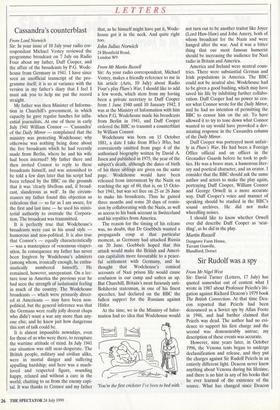From Mr Martin Russell Sir: As your radio correspondent, Michael
Vestey, makes a friendly reference to me in his article (Arts, 10 July) about Radio Four's play Plum's War, I should like to add a few words, which stem from my having been a private secretary to Duff Cooper from 1 June 1940 until 10 January 1942. I was at the Ministry of Information with him when P.G. Wodehouse made his broadcasts from Berlin in 1941, and Duff Cooper ordered the BBC to transmit a counterblast by William Connor.
Wodehouse was born on 15 October 1881, a date I take from Who's Who, but conveniently omitted from page 4 of the authorised biography written by David A. Jasen and published in 1975, the year of the subject's death, although the dates of birth of his three siblings are given on the same page. Wodehouse would have been released from internment by the Nazis on reaching the age of 60, that is, on 15 Octo- ber 1941, but was set free on 25 or 26 June to make his broadcasts. Thus he gained three months and some 20 days of remis- sion by collaborating with the Nazis, as well as access to his bank account in Switzerland and his royalties from America.
The reason for the timing of his release was, no doubt, that Dr Goebbels wanted a propaganda coup at that particular moment, as Germany had attacked Russia on 20 June. Goebbels hoped that this attack would make the British and Ameri- can capitalists more favourable to a peace- ful settlement with Germany, and he thought that Wodehouse's comical accounts of Nazi prison life would cause confusion in our camp and soften us up. But Churchill, Britain's most furiously anti- Bolshevist statesman, in one of his finest speeches, had declared on the BBC the fullest support for the Russians against Hitler.
At the time, we in the Ministry of Infor- mation had no idea that Wodehouse would `You're the first cricketer I've been to bed with.' not turn out to be another traitor like Joyce (Lord Haw-Haw) and John Amery, both of whom broadcast for the Nazis and were hanged after the war. And it was a bitter thing that our most famous humorist should be increasing the audience for Nazi radio in Britain and America.
America and Ireland were neutral coun- tries. There were substantial German and Irish populations in America. The BBC could not be neutral also. Wodehouse had to be given a good bashing, which may have saved his life by inhibiting further collabo- ration. Duff Cooper had no power to cen- sor what Connor wrote for the Daily Mirror, and he had no intention of permitting the BBC to censor him on the air. To have allowed it to try to tone down what Connor wanted to say would have provoked a dev- astating response in the Cassandra column of the Daily Mirror.
Duff Cooper was portrayed most unfair- ly in Plum's War. He had been a Foreign Office official and an officer in the Grenadier Guards before he took to poli- tics. He was a brave man, a humorous liter- ary and poetical character, and an orator. I consider that the BBC should ask the same author and actors to make the play again, portraying Duff Cooper, William Connor and George Orwell in a more accurate way. Duff Cooper's voice and manner of speaking should be studied in the BBC's sound archives. He did not make wheedling noises.
I should like to know whether Orwell ever did describe Duff Cooper as 'scut- tling', as he did in the play.
Martin Russell
Dungrove Farm House, Tarrant Gunville, Blandford, Dorset


























































 Previous page
Previous page